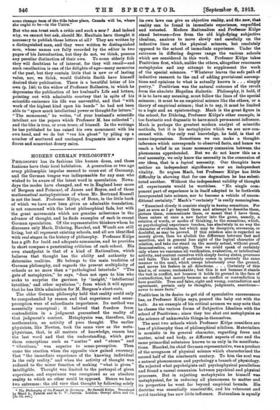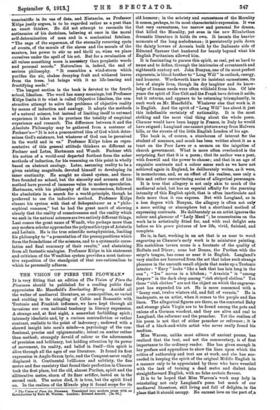MODERN GERMAN PHILOSOPHY.*
PHILOSOPHY has its fashions like human dress, and those fashions have their local habitation. A generation or two ago every philosophic impulse seemed to come out of Germany, and the German tongue was indispensable for any man who wished to be aware of the latest word in speculation. Nowa- days the modes have changed, and we in England hear more of Bergson and Poincare, of James and Royce, and of those mathematical metaphysicians of whom Mr. Bertrand Russell is not the least. Professor Kiilpe, of Bonn, in the little book of which we have now been given an admirable translation, is not concerned' with the latest philosophical fads, but with the great movements which are genuine milestones in the advance of thought, and he finds examples of each in recent German speculation. Of the representative thinkers whom he discusses only Mach, Dithring, Haeckel, and Wundt are still living, but all represent existing schools, and all are identified with real stages in the history of philosophy. Professor Kiilpe has a gift for lucid and adequate summaries, and he provides in short compass a penetrating criticism of each school. His own standpoint is that of a kind of Rationalism, which believes that thought has the ability and authority to determine realities. He belongs to the main tradition of 'German philosophy, and regards the present multiplicity of schools as no more than a " pathological interlude." " The gate of metaphysics," he says, "does not open to him who seeks to surprise the garrison by insight," intellectual intuition,' and other mysticism "; from which it will appear that he has little admiration for M. Bergson's short-cuts.
The older German philosophy held that reality could only be comprehended by reason and that experience and sense- perception were of subordinate importance. Its method was essentially conceptual ; it believed that freedom from contradiction in a judgment guaranteed the reality of that judgment's content. Metaphysics was, therefore, like mathematics, an activity of pure thought. The earlier physicists, like Newton, took the same view as the meta- physicians, that, in all matters of knowledge, reason has the last word and that the understanding, which gave them conceptions such as " matter " and " atoms " and
vibrations," was superior to sense-perception. Then came the reaction when the opposite view gained currency, that " the immediate experience of the knowing individual is the only reality," and when the activity of thought was reduced to the minor function of making " what is given " intelligible. Thought was limited to the portrayal of given experience, and experience was recognized as an absolute reality to which no other could be opposed. Hence we have two extremes : the old view that thought by following solely • The Philosophy of the Present in Germany. By Oswald Stilpe. Translated 1,y Maud L. Patrick and G. T. W. Patrick. London: George Allen and Co. [3s. gd. net.]
its own laws can give us objective reality, and the new, that reality can be found in immediate experience, unpurlfied and untested. Modern Rationalism and Professor Kiilpe stand between—free from the old high-flying subjective idealism, anxious to move slowly and carefully on the inductive lines of the physical sciences, but resolutely opposed to the school of immediate experience. Under the extremes in differing degrees range the various schools which are considered in this work. Professor Kiilpe takes Positivism first, which, unlike the others, altogether renounces metaphysics and any attempt to supplement the work of the special sciences. "Whatever leaves the safe path of inductive research to the end of adding provisional assump- tions and opinions to what is actually known is . . . simply poetry." Positivism was the natural outcome of the revolt from the absolute Hegelian dialectic. Philosophy, it held, if it is to have any meaning, must follow the lines of the special sciences; it must be an empirical science like the others, or a theory of empirical science; that is to say, it must be limited to a logic and an epistemology. Mach is the great figure in the school, for Diihring, Professor Killpe's other example, is too fantastic and dogmatic to have much permanent influence.
Mach is perhaps the greatest modern analyst of scientific methods, but it is his metaphysics which we are now con- cerned with. Our only real knowledge, he held, is that of
sense-impressions. Sometimes we can make a thought- inference which corresponds to observed facts, and hence we reach a belief in an inner necessary connexion between, the phenomena apprehended. But we do not know this as a real necessity, we only know the necessity in the connexion of our ideas, that is a logical necessity. Our thoughts have
neither an independent significance nor an independent vitality. So argues Mach, but Professor Kfilpe has little difficulty in showing that for one dogmatism he has substi- tuted another. Without the independent validity of thought all experiments would be worthless. " No single com- ponent part of experience is in itself adapted to be forthwith incorporated into science, nor to become a vehicle of uncon- ditional certainty." Mach's " certainty " is really meaningless.
"Examined closely it consists simply in haring sensations. For just as soon as I go beyond them and attempt to describe them, picture them, communicate them, or assert that I have them, there enters at once a new factor into the game, namely, a relation of words, or modes of thinking, to the sensations, which, as psychological experience teaches, has absolutely in no way the character of evidence, but which may be deceptive, erroneous, or doubtful, as may be proved. If this relation also is regarded as merely given, then we abolish the difference between fact and assertion, and in general lose sight of the logical character of relation, and take our stand on the merely actual, without proof, demonstration, or critique. Thus we could speak of certainty only where we renounce all verification, evaluation, or intellectual activity, and content ourselves with simply having states, processes and facts. This kind of certainty comes in precisely the same manner to the snail, which creeps laboriously over the ground, and moves his feelers in all directions. . . . Certainty of this kind is, of course, unshakable ; but this is not because it stands the test in conflict, not because it holds its ground in the face of contradiction, but merely because no conflict or contradiction is here possible. True and false, right and wrong, contradiction and agreement, pertain only to thoughts, judgments, assertions— never to mere facts."
Positivism in its desire to get rid of speculative excrescences has, as Professor Kiilpe says, poured the baby out with the bath. As an example of his critical acumen we may note that he classes the various forms of Subjective Idealism with the school of Positivism; since they too shut out metaphysics as the science of unknowable things-in-themselves.
The next two schools which Professor Kiilpe considers are less of philosophy than of philosophical nihilism. Materialism is monistic in its general character, regarding force and matter, mind and body, as different aspects of one and the same primordial substance known to us only in its manifesta- tions. Haeckel, its chief German representative, was a product of the arrogance of physical science which characterized the second half of the nineteenth century. To him the soul was a natural phenomenon and psychology a branch of physiology. He rejected what psycholgists call psychophysical parallelism and found a causal connexion between psychical and physical processes. Bnt in rejecting metaphysics he himself was metaphysical, for in reducing all phenomena to matter and
its properties he went far beyond empirical bounds. His doctrine was essentially unscientific, and his vehement and
acrid teaching has uow little influence. Naturalism is equally
unscientific in its use of data, and Nietzsche, as Professor Xiilpe justly argues, is to be regarded rather as a poet than an exact thinker. He did not attempt to reconcile the antinomies of his doctrines, believing at once in the moral self-determination of man and in a mechanical fatalism. 4' The sage of the superman, of the eternally recurring cycle of events, of the morals of the slaves and the morals of the masters, has power to stir ns and thrill us, when we place ourselves under the spell of his art. But for a revaluation of all values something more is necesdary than prophetic words and personal moods." Naturalism is, indeed, the end of serious philosophy. " It resembles a wind-storm which purifies the air, shakes decaying fruit and withered leaves from the trees, but brings with it no life-bearing and fructifying seeds."
The longest section in the book is devoted to the fourth school, Idealism. The word has many meanings, but Professor Kiilpe limits it to what is called Objective Idealism, the con- structive attempt to solve the problems of objective reality by means of induction and analogy. It adopts the methods of a natural science, but instead of limiting itself to outward experience it takes as its province the totality of empirical experience and research. The difference between it and the Absolute Philosophy may be gathered from a sentence of Fechner's—" It is not a preconceived idea of God which deter- mines God's existence, but whatever of God can be perceived in the world and in us." Professor Kiilpe takes as repre. sentative of this general attitude thinkers so different as Fechner and Lotze, Hartmann and Wundt. Fechner with his notion of a world-soul departed furthest from the sober methods of induction, far his reasoning on this point is wholly based on abstract analogy. Lotze, assuming reality to be a given existing magnitude, devoted himself to developing its inner continuity. He sought no closed system, and there- fore founded no school, but the sincerity and acumen of his method have proved of immense value to modern speculation. Hartmann, with his philosophy of the unconscious, followed the absolutists in a search for a world-principle, though he preferred to use the inductive method. Professor Killpe -classes his system with that of Sehopenhauer as a "philo- sophical romance," but be had the great merit of showing .elearly that the reality of consciousness and the reality which we seek in the natural sciences are two entirely different things. Last comes the great name of Wundt, who perhaps more than any modern scholar approaches the polymathic type of Aristotle and Leibniz. He is the true scientific metaphysician, limiting his philosophy to " a presentation of the presuppositions which form the foundations of the sciences, and to a systematic corre- lation and final summary of their results," and abstaining from all fantastic analogies. Professor Kiilpe in his statement and criticism of the Wundtian system provides a most instruc- tive exposition of the standpoint of that neo-rationalism to which he personally adheres.







































 Previous page
Previous page